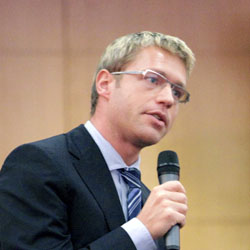Colombianitos: A Winning Management Model for Sustaining, Scaling and Replicating Social Change through Sport? Michael Pedersen
November 28, 2013
With the online visibility at its core, Colombianitos has managed to build a remarkable pool of diversified sources of funding. Main sources of funding are private companies, the Colombian government, sustainability projects and individuals from across the world.
A particularly noteworthy source of funding is Colombianitos’ foundation in the USA with an annual lottery fund-raising event in Atlanta, Georgia at its core. Another noteworthy source of funding is the opportunity for individuals from across the world to sign up on Colombianitos’ website to continuously sponsor the education of a ‘Colombianitos Captain’ for 25 dollars a month. Captains represent a special honorary program to recognize and provide additional support for select children, who are earning good grades, have impeccable school attendance, are drug free and actively give back to the community – as a role model and/or as a mentor to other children. Colombianitos Captains also become eligible for the foundation’s ‘Young Adult Advancement Programs’. Such programs increase the children’s opportunities to receive scholarships for higher education, career assistance and/or career placement services.

Other noteworthy Colombianitos management practices
Other noteworthy Colombianitos management practices, which are supportive of sustaining, scaling and replicating impact, include:
> A comprehensive scorecard with key performance indicators, which provides the basis for assessing continuous performance on a bi-monthly, monthly and bi-annual basis
> Quantitatively measuring performance as the number of children subscribed and % of attendance in activities, among other indicators
> Qualitatively measuring performance as the level of impact as per children’s self-assessment video testimonials on YouTube (see link above), among other indicators
> Integrating parents of the children into the programs through so-called ‘School for Parents’ workshops once every two months
> Paying all administration staff a salary; including a general director, a financial director, an operations director and a sustainability director. Staff at the local points of operation is paid too
> An opportunity for staff to rotate jobs as a tool for further developing their skills, expertise and motivation
Critical questions for sport leaders to ask themselves
Inspired by the case of Colombianitos, critical questions for sport leaders to ask themselves, as they start modernizing ‘sport in society’ governance standards for the future, include:
> What comprises good managements practices in projects that evolve around engaging underprivileged children in doing sport as a vehicle for generating social change?
> How do you best measure and account for the impact of a project? – What is the social change that you would like to generate? – In which ways will a child engaged in doing educational sport in your project have changed, when (s)he exists the program?
> How do you best engage parents as part of the formula for success in your project?
> What comprises good management practices in generating adequate and sustainable project funding for scaling and replicating impact?
> How do you best create project visibility on the Internet and on social media platforms in particular?
> What is your unique pitch to potential sponsors of your project? – Why should they fund your project rather than another similar project?
> What could be the nature of innovative ways to encourage crowd funding as an additional source of funding for your project?
> What is the nature of management standards and levels of transparency and accountability that will best assure your project supporters that their money is spent as intended?
Links to my previous contributions for iSportconnect’s expert column on sport governance:
7) ‘Football in Germany: A Model Case for Addressing Match-Fixing?’
5) ‘England and Wales Cricket Board: A Winning Model for Transparency and Accountability in Sport?’
4) ‘Badminton World Federation: A Winning Model for Democratizing Sport in the 21st Century?’
2) ‘The Business Case for Good Governance in Sport’
1) ‘Sport Governance – What Are We Actually Talking About?’
Michael Pedersen, Founder of M INC., is an internationally recognized expert and leader in good governance, transparency, ethics and integrity.
Michael is the former Head of the World Economic Forum’s Partnering Against Corruption Initiative, an international good governance partnership with over 175 multinational companies and their CEOs. He holds three MSc degrees; an MSc in Global Leadership; an MSc in Responsibility and Business Practice; and an MSc in International Relations.
Michael is passionate about sport. Sport has and continues to play an important role in his life. He is of Danish origin and currently lives in Lima, Peru and in Barcelona, Spain.
He also publishes a leadership series on good governance in sport that is available for free download at: http://minc.ch/sport-practice.html
{jcomments on}



